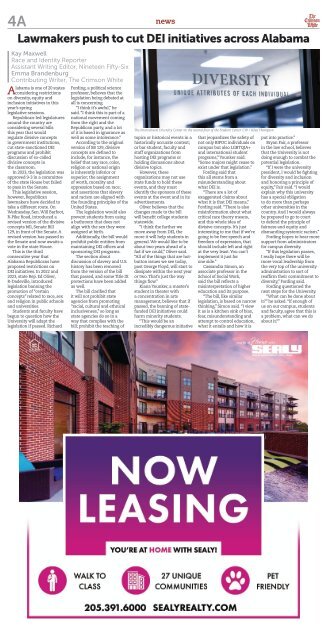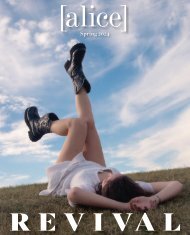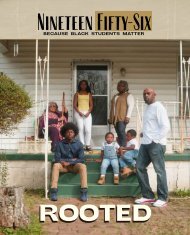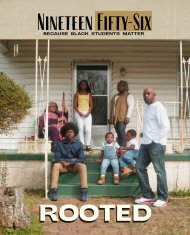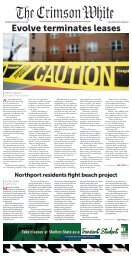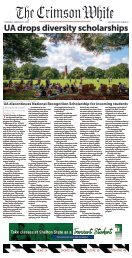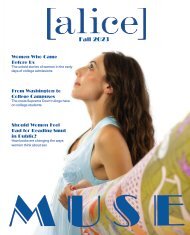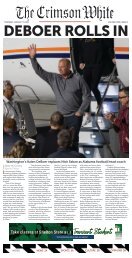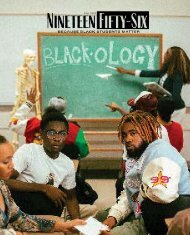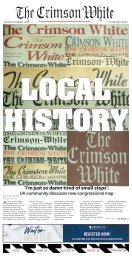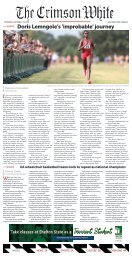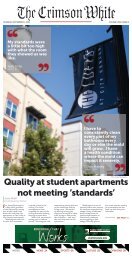The Crimson White Print Edition - February 29th, 2024
Create successful ePaper yourself
Turn your PDF publications into a flip-book with our unique Google optimized e-Paper software.
4A<br />
news<br />
Lawmakers push to cut DEI initiatives across Alabama<br />
Kay Maxwell<br />
Race and Identity Reporter<br />
Assistant Writing Editor, Nineteen Fifty-Six<br />
Emma Brandenburg<br />
Contributing Writer, <strong>The</strong> <strong>Crimson</strong> <strong>White</strong><br />
Alabama is one of 20 states<br />
considering restrictions<br />
on diversity, equity and<br />
inclusion initiatives in this<br />
year’s spring<br />
legislative sessions.<br />
Republican-led legislatures<br />
around the country are<br />
considering several bills<br />
this year that would<br />
regulate divisive concepts<br />
in government institutions,<br />
cut state-sanctioned DEI<br />
programs and prohibit<br />
discussion of so-called<br />
divisive concepts in<br />
the classroom.<br />
In 2023, the legislation was<br />
approved 9-3 in a committee<br />
of the state House but failed<br />
to pass in the Senate.<br />
This legislative session,<br />
however, Republican<br />
lawmakers have decided to<br />
take a different route. On<br />
Wednesday, Sen. Will Barfoot,<br />
R-Pike Road, introduced a<br />
revised version of the divisive<br />
concepts bill, Senate Bill<br />
129, in front of the Senate. A<br />
revised version has passed in<br />
the Senate and now awaits a<br />
vote in the state House.<br />
This is the third<br />
consecutive year that<br />
Alabama Republicans have<br />
proposed restrictions on<br />
DEI initiatives. In 2022 and<br />
2023, state Rep. Ed Oliver,<br />
R-Dadeville, introduced<br />
legislation banning the<br />
promotion of “certain<br />
concepts” related to race, sex<br />
and religion in public schools<br />
and universities.<br />
Students and faculty have<br />
begun to question how the<br />
University will adapt the<br />
legislation if passed. Richard<br />
Fording, a political science<br />
professor, believes that the<br />
legislation being debated at<br />
all is concerning.<br />
“I think it’s awful,” he<br />
said. “I think this is part of a<br />
national movement coming<br />
from the right and the<br />
Republican party, and a lot<br />
of it is based in ignorance as<br />
well as some intolerance.”<br />
According to the original<br />
version of SB 129, divisive<br />
concepts are defined to<br />
include, for instance, the<br />
belief that any race, color,<br />
religion or national origin<br />
is inherently inferior or<br />
superior; the assignment<br />
of worth, morality and<br />
oppression based on race;<br />
and assertions that slavery<br />
and racism are aligned with<br />
the founding principles of the<br />
United States.<br />
<strong>The</strong> legislation would also<br />
prevent students from using<br />
a bathroom that does not<br />
align with the sex they were<br />
assigned at birth.<br />
Additionally, the bill would<br />
prohibit public entities from<br />
maintaining DEI offices and<br />
sponsoring DEI programs.<br />
<strong>The</strong> section about<br />
discussion of slavery and U.S.<br />
history has been removed<br />
from the version of the bill<br />
that passed, and some Title IX<br />
protections have been added<br />
as well.<br />
<strong>The</strong> bill clarified that<br />
it will not prohibit state<br />
agencies from promoting<br />
“racial, cultural and ethnical<br />
inclusiveness,” so long as<br />
state agencies do so in a<br />
way that complies with the<br />
bill; prohibit the teaching of<br />
<strong>The</strong> Intercultural Diversity Center on the second floor of the Student Center. CW / Riley Thompson<br />
topics or historical events in a<br />
historically accurate context;<br />
or bar student, faculty and<br />
staff organizations from<br />
hosting DEI programs or<br />
holding discussions about<br />
divisive topics.<br />
However, these<br />
organizations may not use<br />
state funds to hold these<br />
events, and they must<br />
identify the sponsors of these<br />
events at the event and in its<br />
advertisements.<br />
Oliver believes that the<br />
changes made to the bill<br />
will benefit college students<br />
statewide.<br />
“I think the farther we<br />
move away from DEI, the<br />
more it will help students in<br />
general. We would like to be<br />
about two years ahead of a<br />
fad if we could,” Oliver said.<br />
“All of the things that are hotbutton<br />
issues we see today,<br />
post George Floyd, will start to<br />
dissipate within the next year<br />
or two. That’s just the way<br />
things flow.”<br />
Kiana Younker, a master’s<br />
student in theater with<br />
a concentration in arts<br />
management, believes that if<br />
passed, the banning of statefunded<br />
DEI initiatives could<br />
harm minority students.<br />
“This would be an<br />
incredibly dangerous initiative<br />
that jeopardizes the safety of<br />
not only BIPOC individuals on<br />
campus but also LGBTQIA+<br />
and international student<br />
programs,” Younker said.<br />
“Some majors might cease to<br />
exist under that legislation.”<br />
Fording said that<br />
this all stems from a<br />
misunderstanding about<br />
what DEI is.<br />
“<strong>The</strong>re are a lot of<br />
exaggerated claims about<br />
what it is that DEI means,”<br />
Fording said. “<strong>The</strong>re is also<br />
misinformation about what<br />
critical race theory means,<br />
and this whole idea of<br />
divisive concepts. It’s just<br />
interesting to me that if we’re<br />
going to be free speech and<br />
freedom of expression, that<br />
should include left and right<br />
at the very least. You can’t<br />
implement it just for<br />
one side.”<br />
Cassandra Simon, an<br />
associate professor in the<br />
School of Social Work,<br />
said the bill reflects a<br />
misinterpretation of higher<br />
education and its purpose.<br />
“<strong>The</strong> bill, like similar<br />
legislation, is based on narrow<br />
thinking,” Simon said. “I view<br />
it as is a kitchen sink of bias,<br />
fear, misunderstanding and<br />
attempt to control education,<br />
what it entails and how it is<br />
put into practice.”<br />
Bryan Fair, a professor<br />
in the law school, believes<br />
that the University is not<br />
doing enough to combat the<br />
potential legislation.<br />
“If I were the university<br />
president, I would be fighting<br />
for diversity and inclusion<br />
and honoring a principle of<br />
equity,” Fair said. “I would<br />
explain why this university<br />
has a special obligation<br />
to do more than perhaps<br />
other universities in the<br />
country. And I would always<br />
be prepared to go to court<br />
to defend the principle of<br />
fairness and equity and<br />
dismantling systemic racism.”<br />
Fording hopes to hear more<br />
support from administrators<br />
for campus diversity.<br />
“If this legislation passes,<br />
I really hope there will be<br />
more vocal leadership from<br />
the very top of the university<br />
administration to sort of<br />
reaffirm their commitment to<br />
diversity,” Fording said.<br />
Fording questioned the<br />
next steps for the University.<br />
“What can be done about<br />
it?” he asked. “If enough of<br />
us on our campus, students<br />
and faculty, agree that this is<br />
a problem, what can we do<br />
about it?”


